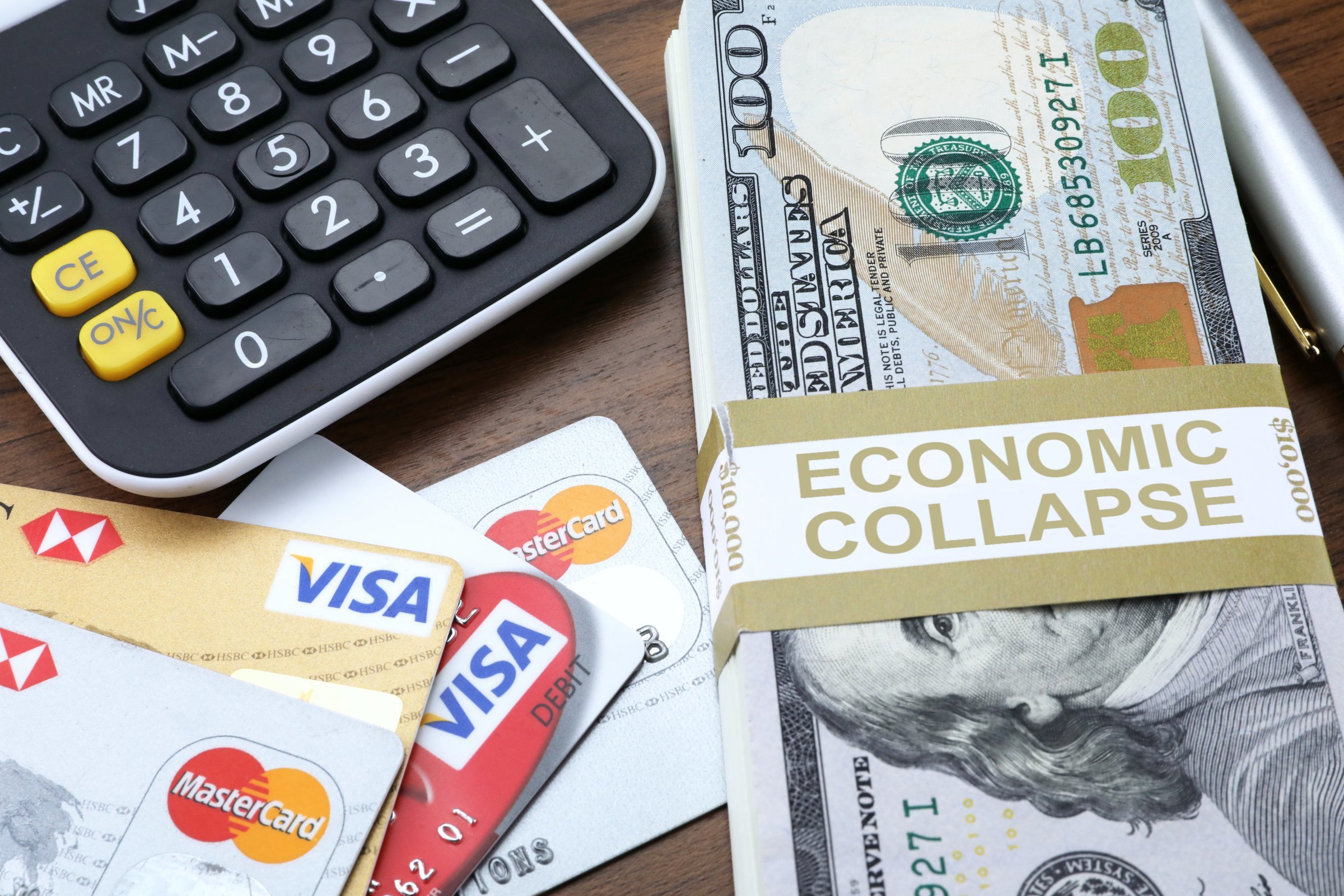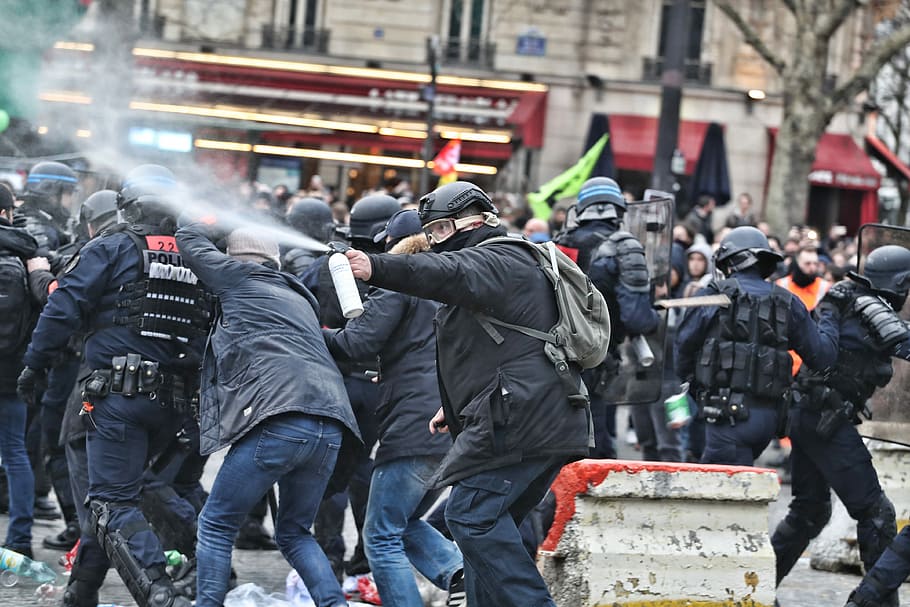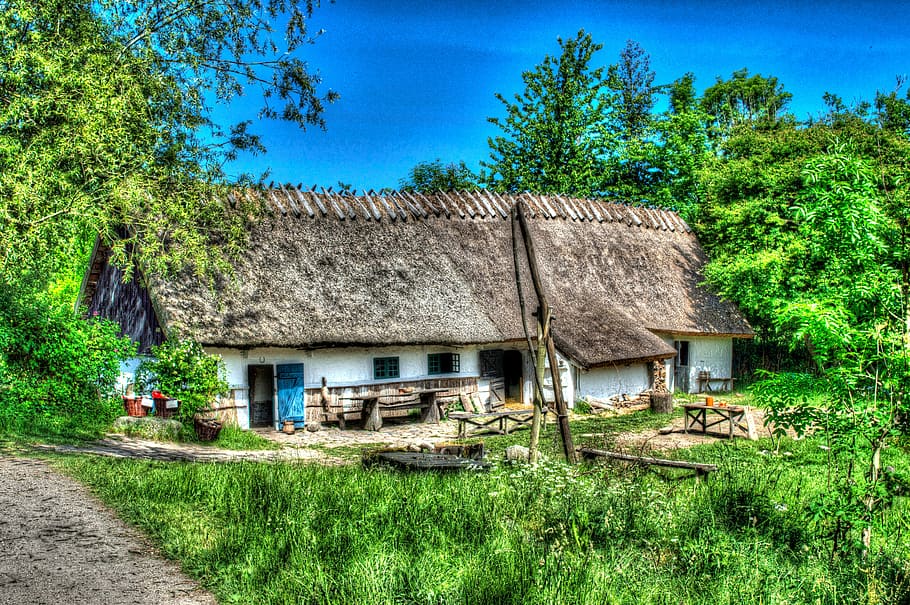Weekly News Roundup 27/08/23
- News
- August 27, 2023

Financial collapse is a catastrophic event that occurs when the value of an economy’s financial assets, such as stocks, bonds, and currencies, falls dramatically, leading to widespread economic distress. It can be triggered by a range of factors, including a major recession, hyperinflation, or a debt crisis.
During a financial collapse, banks may fail, businesses may go bankrupt, and people may lose their jobs and savings. The consequences can be devastating, leading to social unrest and political upheaval. The effects of a financial collapse can last for years, even decades, and may require significant government intervention to address.
The global financial crisis of 2008 is a recent example of a financial collapse that had widespread consequences. It was triggered by a housing market crash in the United States, which led to a wave of foreclosures and a sharp decline in the value of mortgage-backed securities. As the crisis spread, banks across the world began to fail, and governments were forced to intervene with massive bailouts to prevent a complete collapse of the financial system.
Preppers and survivalists in the UK should be aware of the potential for a financial collapse to occur and take steps to prepare themselves for the worst-case scenario. This may include diversifying their investments, building up a stockpile of essential supplies, and developing skills that can be useful in a bartering economy. It’s also important to have a plan in place for securing their assets and protecting their families during times of economic turmoil. By being proactive and prepared, preppers and survivalists can increase their chances of surviving a financial collapse and rebuilding their lives in its aftermath.
A financial collapse is a catastrophic event that can have far-reaching consequences for individuals, businesses, and entire economies. Here are 10 things that can happen in a financial collapse:

A troubled economy can have far-reaching consequences, from job losses to market volatility and inflation. Recognizing the warning signs of a troubled economy can help preppers and survivalists in the UK prepare for economic instability and safeguard their finances. Here are seven warning signs of a troubled economy that preppers should be aware of:
By keeping an eye out for these warning signs, preppers and survivalists can take steps to protect themselves against a potential economic downturn. They may consider increasing their cash reserves, diversifying their investments, or investing in tangible assets such as precious metals, real estate, or farmland. Preppers can also consider learning new skills that can be useful in an economic crisis, such as growing their own food, bartering, or repairing items rather than buying new ones. By being proactive and prepared, preppers can increase their chances of surviving and thriving during an economic crisis.
Yes, preppers and survivalists in the UK should consider buying gold and silver as a way to protect themselves against a potential financial collapse. Precious metals like gold and silver have been used as a store of value for centuries and have proven to be a reliable hedge against inflation, economic instability, and currency devaluation.
During times of economic crisis, people often turn to precious metals as a safe haven investment. This is because gold and silver are not subject to the same market fluctuations and economic pressures as other assets, such as stocks and bonds. Instead, they tend to hold their value over time and can even increase in value when other assets are declining.
Another benefit of investing in gold and silver is their portability and liquidity. Unlike real estate or other tangible assets, gold and silver can be easily transported and traded, making them a useful form of currency in times of economic turmoil. In addition, there is a large and active market for buying and selling gold and silver, which makes it easy to buy or sell when needed.
When buying gold and silver, preppers and survivalists should do their research and choose a reputable dealer who sells authentic products at fair prices. They may also consider diversifying their investment portfolio by buying different types of precious metals, such as coins, bars, and bullion.
It’s important to note that while gold and silver can be a valuable addition to a prepper’s investment strategy, they should not be relied upon as the sole means of protection against a financial collapse. Preppers should also consider building up a stockpile of essential supplies, developing useful skills, and taking other steps to prepare for a potential economic crisis. By being proactive and prepared, preppers and survivalists can increase their chances of weathering a financial collapse and emerging stronger on the other side.

While precious metals like gold and silver can be a useful addition to an investment portfolio, whether they are a good investment or not depends on individual circumstances and goals.
Investors often see precious metals as a safe-haven during times of economic uncertainty or inflation. Precious metals have been used as a form of currency and a store of value for thousands of years, and they have a long history of maintaining their value over time. As a result, they can provide a measure of stability and diversification to an investment portfolio.
However, it’s important to note that the value of precious metals can be volatile and subject to market fluctuations. Additionally, buying and selling precious metals can be expensive due to transaction fees and premiums. Investors should also consider the cost of storing and securing their precious metals investments, as well as the potential tax implications of buying and selling.
Another factor to consider is the potential return on investment. While precious metals can provide a measure of stability to a portfolio, they may not generate the same returns as other investments such as stocks, bonds, or real estate. This means that investors who are looking for high returns may need to consider other options.
Ultimately, the decision to invest in precious metals should be based on individual circumstances and goals. Those who are looking for a reliable store of value and protection against economic instability may find precious metals to be a good investment. However, those who are looking for higher returns or who are focused on long-term growth may need to consider other options.
It’s important for investors to do their research and consult with a financial advisor before making any investment decisions. By being informed and proactive, investors can make smart investment choices that can help protect their finances and increase their chances of surviving and thriving during times of economic turmoil.
A financial collapse is a catastrophic event that can have far-reaching consequences for the economy and the population of a country. While the exact outcomes of a financial collapse are difficult to predict, there are several ways that a collapse could affect the UK economy and its citizens.
In conclusion, a financial collapse could have severe and long-lasting consequences for the UK economy and its citizens. It could lead to a breakdown of the banking system, job losses, inflation, reduced government spending, market volatility, increase in crime, political instability, housing market crash, and food shortages.
Preppers and survivalists in the UK should take steps to prepare themselves for the potential economic upheaval, including diversifying their investments, building up a stockpile of essential supplies, and developing skills that can be useful in a bartering economy. By being proactive and prepared, preppers and survivalists can increase their chances of surviving and thriving during a financial collapse.
A financial collapse is a catastrophic event that can be triggered by a range of economic and political factors. Here are ten scenarios that could result in a financial collapse:

Financial collapses can occur quickly and unexpectedly, but there are often warning signs that can indicate that a collapse is imminent. Here are some of the first signs of a financial collapse:

A financial collapse can be a chaotic and frightening event that can impact every aspect of life. Here’s a potential scenario of what could happen during a financial collapse:
As the economy begins to falter, people start to panic. They rush to withdraw their money from banks, causing banks to run out of cash and leading to bank failures. As more banks fail, people lose faith in the banking system and the government’s ability to protect their money.
As the crisis deepens, businesses start to fail, leading to a rise in unemployment. This, in turn, leads to a decrease in consumer spending, causing even more businesses to fail. The government tries to stimulate the economy by printing more money and lowering interest rates, but this only leads to hyperinflation and a further devaluation of the currency.
With the collapse of the banking system, people start to rely on bartering and using gold and silver as currency. The black market thrives as people seek out goods and services that are hard to come by. Crime rates soar as people become desperate for money and resources.
The government declares a state of emergency and imposes martial law, giving the military direct control over the population. Curfews are imposed, and people are not allowed to leave their homes without permission. The government starts to seize assets and property to maintain control over the population.
The food supply becomes scarce as farmers can’t afford to plant crops or harvest them. Food prices skyrocket, and people start to go hungry. Riots and protests break out as people demand food and government intervention.
As the crisis continues, the infrastructure of society starts to break down. There are power outages and shortages of clean water. Hospitals become overwhelmed and can’t provide adequate medical care. People start to die from preventable diseases and lack of medical attention.
In this scenario, the collapse lasts for several years, with no end in sight. The government becomes increasingly authoritarian, and civil liberties are eroded. The economy is in shambles, and people struggle to survive day-to-day. It’s a bleak and terrifying future that no one wants to imagine.
A financial collapse can be a devastating event that can affect every aspect of life. Here are some of the main hazards of a financial collapse:

Preparing for a financial collapse requires a different mindset and approach to everyday life. Here are some key things to keep in mind:
Preparing your home for a financial collapse is an important step in ensuring your safety and survival. Here are some tips on how to prepare your home for a financial collapse, taking into consideration people’s behavior and the state of the country during such a time:
By following these tips, you can help ensure your home is a safe and secure haven during a financial collapse, and increase your chances of survival.
Preparing for a financial collapse requires careful planning and investment in essential prepping items. Here are 20 items that are essential for surviving a financial collapse and why you need them:

Surviving a financial collapse can be a challenging experience, but there are several steps that you can take to improve your chances of survival. Firstly, building a stockpile of essential items like food, water, and medical supplies is crucial. It’s important to stockpile non-perishable foods that are easy to prepare and have a long shelf life. Water filtration systems and water storage containers should also be included in your preparations.
Another essential aspect of surviving a financial collapse is securing your home. During a financial collapse, there may be an increase in crime and civil unrest, and it’s important to take steps to protect yourself and your family. Consider reinforcing doors and windows, installing security cameras, and investing in a home security system.
In a financial collapse scenario, communication and information will be vital. Ensure that you have an emergency radio and keep it tuned to emergency channels. Additionally, having a supply of batteries and a solar charger can ensure that your communication devices remain operational.
It’s also important to be able to defend yourself and your family in a financial collapse scenario. Investing in a personal defense tool like pepper spray or a stun gun is one option. Additionally, consider learning basic self-defense skills and situational awareness techniques.
In a financial collapse scenario, transportation may become difficult or even impossible. Consider investing in a bicycle or other non-motorized transportation options. These will be reliable modes of transportation even if fuel is scarce or unavailable.
Finally, it’s essential to stay informed about the situation. Keep up-to-date with news and information about the financial collapse, and network with other preppers to share tips and resources. With careful planning and preparation, you can increase your chances of surviving a financial collapse.
When preparing for a financial collapse, one of the most important decisions you will make is whether to bug out or bug in. Both options have their advantages and disadvantages, and the choice you make will depend on a variety of factors.
Bugging In:
Bugging in means staying in your home or current location during a financial collapse. One of the main advantages of bugging in is that you will have access to your stockpile of essential items and be able to stay in a familiar and secure location. Additionally, staying in your home may provide some level of protection from external threats like looters or rioters. You can also reinforce your home’s security measures to make it less vulnerable to break-ins.
However, bugging in may not be a viable option for everyone. If you live in an urban area, there may be a high risk of civil unrest and violence during a financial collapse. In this scenario, it may be safer to evacuate to a rural location. Additionally, if you live in an apartment or other shared living space, you may not have the space or resources to stockpile essential items for a long period of time.
Bugging Out:
Bugging out means evacuating your home or current location during a financial collapse. The main advantage of bugging out is that it allows you to escape potential danger and find a safer location to wait out the crisis. In a rural location, you may have access to natural resources like water and food, which can help you survive for an extended period of time.
However, bugging out also has its disadvantages. Evacuating requires significant planning and resources, and you may be leaving behind essential items and resources that could help you survive. Additionally, if you are evacuating to an unfamiliar location, you may be more vulnerable to external threats like wild animals or unfriendly locals.
Ultimately, the decision to bug out or bug in will depend on your personal circumstances and risk tolerance. If you live in an area with a high risk of civil unrest and violence, bugging out may be the safer option. However, if you have a secure home and ample resources, bugging in may be the better choice.
Regardless of your decision, it’s important to have a plan in place and to be prepared for any eventuality. Stockpile essential items, reinforce your home’s security measures, and have a bug-out bag ready in case you need to evacuate quickly. With careful planning and preparation, you can increase your chances of surviving a financial collapse.
After a financial collapse, it is unlikely that life will return to normal quickly or easily. The severity of the financial collapse will play a major role in determining how long it takes for things to stabilize.
In the event of a severe financial collapse, the effects could be felt for years or even decades. High unemployment rates, widespread poverty, and political instability may become the norm. Basic necessities like food, water, and medical care may be scarce, and people may have to rely on bartering or other alternative forms of trade.
One potential solution to the aftermath of a financial collapse is the implementation of a central bank digital currency (CBDC). A CBDC is a digital form of fiat currency that is issued and regulated by a central bank. One of the main advantages of a CBDC is that it can be used to quickly distribute funds to individuals and businesses in times of economic hardship.
For example, during a financial collapse, a CBDC could be used to distribute emergency funds to those who need them. Additionally, a CBDC could help to stabilize the economy by providing a secure and efficient means of payment that is not subject to the same risks as traditional forms of currency.
However, the implementation of a CBDC is not without its challenges. The technology required to create and manage a CBDC is complex, and there are concerns about privacy and security. Additionally, the introduction of a CBDC could lead to the displacement of traditional banks and financial institutions, which could have significant economic and social consequences.
In conclusion, while it is difficult to predict exactly what will happen after a financial collapse, it is unlikely that life will return to normal quickly or easily. The severity of the collapse will play a major role in determining how long it takes for things to stabilize. The implementation of a CBDC could potentially help to mitigate some of the effects of a financial collapse, but it is not a panacea and comes with its own set of challenges. It’s important to be prepared for any eventuality and to have a plan in place to weather the storm.




British Prepper is dedicated to bringing you the most useful information on a wide variety of prepper, survivalist and bushcraft related topics. We really hope that a major SHTF situation never strikes the United Kingdom, but as the old saying goes, failing to prepare is preparing to fail - so always be prepared!





